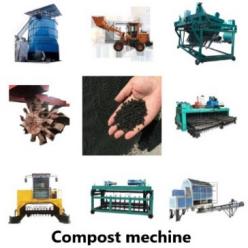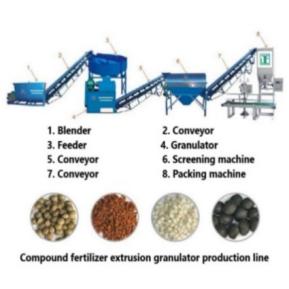Industrial composting machine
An industrial composting machine is a robust and efficient solution designed to streamline large-scale composting operations. These machines are specifically engineered to handle significant volumes of organic waste, accelerating the composting process and producing high-quality compost on an industrial level.
Benefits of Industrial Composting Machines:
Increased Processing Capacity: Industrial composting machines are designed to handle substantial quantities of organic waste, making them suitable for large-scale operations. They significantly increase processing capacity, enabling the efficient management of organic waste generated from municipalities, industries, and agricultural activities.
Enhanced Efficiency and Time Savings: These machines optimize the composting process, reducing the time required for decomposition. Their advanced technology, such as automated controls and optimized airflow systems, promotes efficient decomposition, resulting in shorter composting cycles and increased productivity.
Improved Compost Quality: Industrial composting machines facilitate the production of high-quality compost. Through precise temperature control, optimal moisture levels, and thorough mixing, these machines create an ideal environment for microorganisms to break down organic waste effectively. The resulting compost is rich in nutrients, free from contaminants, and suitable for various applications.
Waste Diversion and Environmental Benefits: By diverting organic waste from landfills and incineration, industrial composting machines contribute to waste reduction and environmental preservation. Composting organic waste prevents the release of harmful greenhouse gases, such as methane, while producing valuable compost that can be used to enrich soil and promote sustainable agriculture.
Key Features of Industrial Composting Machines:
Large Processing Capacity: Industrial composting machines are designed to handle substantial volumes of organic waste, typically measured in tons. Consider the specific capacity requirements of your operation when selecting a machine.
Efficient Mixing and Aeration: These machines employ advanced mixing and aeration systems to ensure thorough blending of the organic waste, facilitating decomposition. Look for machines with efficient turning mechanisms, adjustable aeration systems, and automated controls for optimal results.
Temperature and Moisture Control: Industrial composting machines often incorporate temperature and moisture monitoring systems. These features allow precise control of the composting conditions, ensuring ideal temperature ranges and moisture levels to support the growth of beneficial microorganisms.
Robust Construction and Durability: Given the demands of large-scale operations, industrial composting machines are built with sturdy materials to withstand heavy use. Look for machines constructed from high-quality, corrosion-resistant materials to ensure durability and longevity.
Applications of Industrial Composting Machines:
Municipal Solid Waste Management: Industrial composting machines are widely used in municipal solid waste management systems to process organic waste, including food scraps, yard waste, and green waste. These machines enable municipalities to divert organic waste from landfills, reduce waste volume, and produce compost for landscaping, soil improvement, and erosion control.
Agricultural and Farming Operations: Industrial composting machines are employed in agricultural and farming operations to manage crop residues, livestock manure, and other agricultural waste. The compost produced can be used as a nutrient-rich soil amendment, promoting sustainable farming practices and reducing the reliance on synthetic fertilizers.
Food Processing and Manufacturing Industries: Industrial composting machines are utilized by food processing and manufacturing industries to manage organic waste generated during production. These machines efficiently process food waste, enabling companies to minimize waste disposal costs, comply with environmental regulations, and produce compost for reuse or commercial purposes.
Composting Facilities and Compost Manufacturers: Industrial composting machines are integral to composting facilities and compost manufacturers. These machines streamline the composting process, increase production capacity, and ensure consistent quality in the compost output, supporting the commercial production of high-quality compost for various industries and markets.






